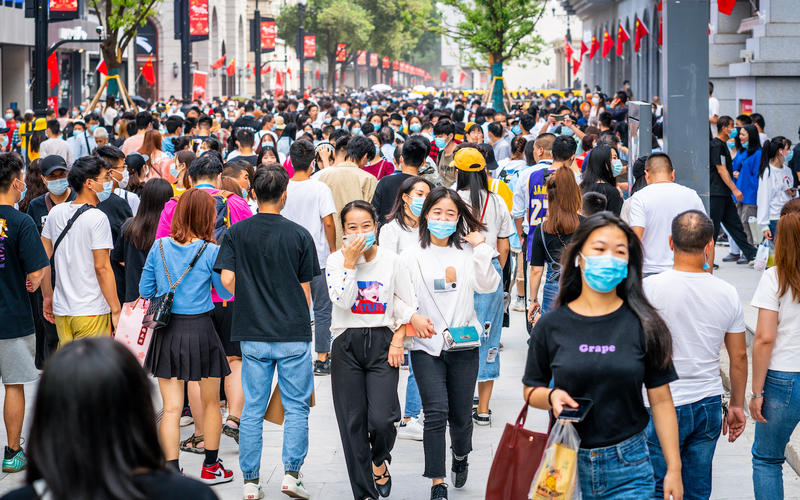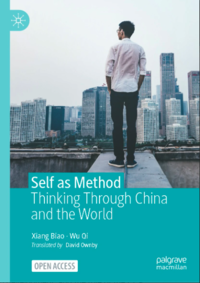A SURPRISE PUBLISHING HIT

A SURPRISE PUBLISHING HIT
Former Oxford Professor Xiang Biao has scored a massive publishing success with an unconventional book.
Published: 24 May 2023
Author: Richard Lofthouse
Share this article

Self as Method: Thinking through China and the World by Xiang Biao and Wu Qi, translated by David Ownby. (Palgrave Macmillan: 2022. Open Access)
Bear with us here. The title doesn’t translate very well and the publisher has perhaps wisely made this title free and open online access. Yet this book has been a phenomenon in China and there’s an intriguing Oxford angle to the author, who until he moved to the Max Planck Institute was a Professor of Social Anthropology at the University.
The Chinese version, 把自己作为方法, was named the ‘most impactful book of 2021’ by Dou4ban4, China’s premier website for rating books, films, and music. The English translation reached 157,000 downloads in the first two months after it was released last year.
The author has conversations with Wu Qi and the result is much more accessible than an academic book yet it is still an academic ‘in conversation with…’, and you think: 262 pages of meandering conversation and it’s a hit with the Tik Tok generation?
The translator David Ownby pens an excellent and considered introduction, which is worth reading in its own right.
He attributes the impact of the book partly to its timing. China has had a tough run of late and youth unemployment ramped up to 20% in 2022. Many young workers are running very hard to stand still. The China dream is precarious.
Self as Method is a set of three interviews conducted in March, August, and December of 2018, in Beijing, Oxford, and Wenzhou, respectively.
Ownby says,
‘His [Xiang’s] method—and there is more method than theory in much of his work—is to understand how complex systems function, and then to explore the potential of individual agency within this system. At the risk of getting ahead of ourselves, I might point out that this might well be an appealing strategy for autonomous young people in China trying to actualize their agency in the People’s Republic. Indeed, Self as Method might well be read as a reflection on potential individual agency in a complex, platform-driven, globalized world.’
We should add that the book is written in accessible language, one strength of a conversational approach.
The author says he liked this quality about Oxford – the aversion to high falutin’ theory, the honesty of a tutorial where you either understand something or you don’t:
‘A table is a table, a bench is a bench, and a coffee table is a coffee table.’
He correctly lays this at the feet of empiricism and praises Sir Isaiah Berlin in particular.
Born in 1972, Xiang is an anthropologist, and currently head of Anthropology at the Max Planck Institute. But that’s not as important as his being younger than the majority of ‘establishment academics’ within China, argues Ownby, or that he was so constrained as a young teacher by the academic consequences of Tiananmen Square that he went off to study migrant workers in Zhejiang Village, so that he could at least be creatively engaged around entrepreneurs and ‘ordinary people’ who were busily building a cottage industry making leather jackets.
So he’s got this common touch, the so-called ‘gentry disposition’ which means rootedness in a specific community, a concept particular to China.
But he’s also an expert in nailing the fact that sure, everyone in China is hugely constrained by a thuggish neo-Leninist state, not least academics. But he’s less bothered by that (obvious) constraint and more interested in how it’s still possible to unlock and express agency, and I think that’s what has hit a rich, winning streak in China right now and beyond.
By ‘and beyond’ we return to Ownby’s excellent introduction. How to achieve agency and personal meaning in a very overwhelming world is a preoccupation of current undergraduate students at Oxford and perhaps most thoughtful young adults. Democracy is on the ropes and we are in a volatile, multi-polar world.
Ownby volunteers, ‘What Xiang Biao calls for is a kind of intellectual activism, grounded in the idea that in our global, wired universe, most people have the resources to understand their position in the various worlds they occupy, and on the basis of that understanding, to activate their agency to solve problems, thus making life better for individuals and communities.’
Elsewhere, Xiang says, ‘In China, whether or not you can get something done depends on how determined you are, and if you have this kind of small-scale unity, you can be enough of a pest to succeed.’
On Oxford, he’s thoroughly entertaining, and thoughtful.
Everyone in the University would profit from his impression of the place.
‘Another thing is Oxford’s self-confidence. I can’t pull it off, but it looks like fun. Britain basically has no private universities, and Oxford and Cambridge are both public, like Beida and Tsinghua. Superficially, it looks like the government runs Oxford, but in fact, Oxford runs the government…’
He also perceives Oxford as an 800-year old ‘high-level “commune”’. A reminder that part of what makes Oxford great is a degree of levelling around a higher cause, scholarship, and many assets like common rooms and common dining rooms and gardens, held in common and enjoyed together. Note that he carefully doesn’t use the ideologically charged word communism!
He likes that English academics are not for the most part paid too much or obsessed with pay, or too unequal among each other. We’re not American in that regard, as he sees it.
He also likes that when he was at Oxford he was left alone to think without being hectored for trendiness or new jargon, which he also associates with America.
He jokes with his interlocutor Wu Qi that he’s actually ‘a typical petty-bourgeois populist’.
Maybe. But what he’s done here is isolate a path for young adults through the dense thicket of 21st century China, where all is not as it may seem and hardship lies close to hand.
There are too many echoes with the world ex-China, to make the book a China-only read so well done the publisher for making the text available to all.
While the book may evoke deep-seated Asian Japanese self-help traditions (think, Ikigai: The Japanese Secret to a Long and Happy Life), the reality is that this book is a bit unique, and uniquely demanding.
Like most publishing hits and flops, no one could have anticipated how it would fare until it hit the marketplace.
The book can be downloaded here: https://link.springer.com/book/10.1007/978-981-19-4953-1
Picture credit: Shutterstock. Book jacket credit: Palgrave.















